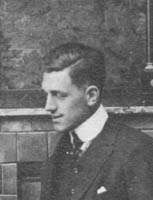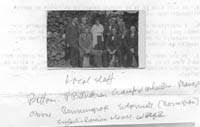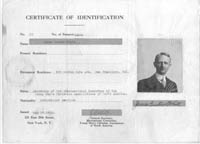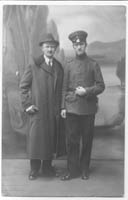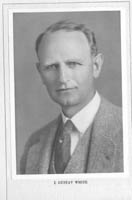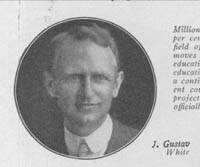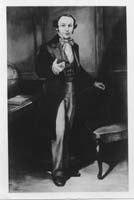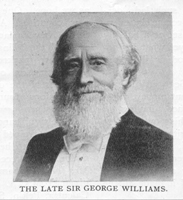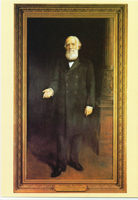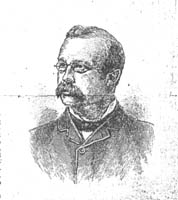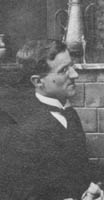Table of Contents
Key Figures
YMCA Secretaries
a | b | c | d | e | f | g | h | j | k | l | m | n-o | p | r | s | t-u | v | w | y-z
Heinrich Waldvogel
A Swiss YMCA secretary, Waldvogel volunteered to serve as a World's Alliance WPA Secretary in the Dual Monarchy after most of the American WPA Secretaries left the empire in April 1917. Waldvogel arrived in Austria-Hungary in July 1918 and conducted POW relief operations in Lower Austria (Niederösterreich), at Purgstall and Wieselburg, and in Upper Austria (Oberösterreich), at Hart.
James N. Wallace
An American YMCA Secretary, the International Committee assigned James Wallace to serve on Archibald C. Harte's staff in Europe by November 1916. Wallace served in an administrative capacity but was assigned to other duties after the United States broke off diplomatic relations with Germany in February 1917.
Thorsten Wallenius
This Swedish YMCA secretary volunteered for POW relief service in Austria-Hungary as a neutral worker, to replace the American War Prisoners Aid Secretaries who departed the empire in April 1917. The World's Alliance assigned Wallenius to Bohemia, where he resumed WPA operations at Braunau-in-Böhmen by August 1917 and in Josefstadt in January 1918.
Joseph E. Wehner (d. 1918)
This American YMCA secretary volunteered to serve Allied prisoners of war in Germany as a War Prisoners Aid Secretary. He arrived in Germany in April 1916 and Conrad Hoffman assigned him to serve as a Field Secretary. Wehner left Germany with most of the other American WPA Secretaries in February 1917 when Washington broke off diplomatic relations with Berlin. Wehner went to Switzerland and decided to enlist in the U.S. Army. He was killed in action on the Western Front in 1918.
Johannes Weise
A member of the German National YMCA Committee after World War I, Weise conducted intensive negotiations with John R. Mott during the latter's visit to Berlin in May 1920 to determine his role in support of the Allies during the war. Weise and other members of the committee grilled Mott regarding the American's participation in the Root Mission to Russia in 1917, the Mexican Commission in 1916, the war guilt clause of Article of 231 of the Versailles Treaty, his lack of support for German missionaries, and even his friendship with President Woodrow Wilson. Mott was eventually able to convince the Germans that his intentions were sincere and Christ-based which helped heal the rift between the two national Associations.
Roy Alvin Welker
This American YMCA secretary volunteered to serve Allied prisoners of war in Austria-Hungary as a War Prisoners Aid Secretary. Welker arrived in the Dual Monarchy in January 1917 and Edgar MacNaughten assigned him to serve as a Field Secretary at the prison camps at Kleinmünchen and Mauthausen in Upper Austria (Oberösterreich). He focused his service on collecting books for Italian prisoners of war to stock prison libraries. Welker left the Dual Monarchy in April 1917 with most of the other American WPA Secretaries as tensions between Austria-Hungary and the United States grew increasingly strained.
Jacob Wettstein
This Swiss YMCA secretary volunteered to become a World's Alliance War Prisoners Aid Secretary in Austria-Hungary after the American WPA workers left the Dual Monarchy. Wettstein began his service at Grödig in Salzburg, replacing Lars Stubbe Teglbjärg, in October 1917. He then expanded POW relief operations to prison camps in Oberösterreich (Upper Austria) in December 1917, working at Aschbach, Braunau-am-Inn, and Marchtrenck.
Crawford Wheeler
This American YMCA secretary volunteered to work for the International Committee as a War Prisoners Aid Secretary in Germany. He arrived in Germany in April 1916 and served as a Field Secretary. While most of the American WPA workers left the empire in February 1917, when the U.S. broke off diplomatic relations with Germany, Wheeler remained with Conrad Hoffman until April 1917. Before proceeding to Russia, Wheeler spent time in Denmark, Norway, and Sweden to train neutral WPA secretaries en route to replace American workers in Germany and Austria-Hungary. From 1917 to 1919, Wheeler conducted war work for Russian soldiers and extended services to troops in the Allied Expeditionary Force in Archangel.
J. Gustav White (1881-1979)
Born in Denmark, White's family immigrated to the United States when he was five years old. He served as the General Secretary of the University of California Association from 1905 to 1906. He then became an Education Secretary and worked at Associations in Salt Lake City, Buffalo, and San Francisco. In April 1916, White volunteered to serve as a War Prisoners Aid Secretary in Germany, accompanied by his wife. He was assigned to prison camps in the III Army Corps, based in Berlin, and maintained operations in twenty-eight prison camps. White left Germany with most of the other American WPA Secretaries in February 1917 when the U.S. broke off diplomatic relations with the German Empire. Initially assigned to Sweden to assist Karl Fries, he instead remained in Switzerland where he became the Education Secretary for the World's Committee in Geneva. White wrote the manual which explained the development of education programs in prison camps. He also worked in Bern, taking on the responsibility of locating American prisoners of war in Germany. At the end of 1917, White decided to support American troops and became an Education Secretary at the American Expeditionary Force-YMCA Headquarters in London. In addition, he resumed Russian work for troops on the Western Front. In 1918, White contracted tuberculosis, which required a period of rest and recuperation. He returned to the United States and in 1919 he became an Education Secretary for the International Committee in New York. White moved to California in 1921 and became the educational director of the Los Angeles YMCA. Two years later, he took on the additional position of dean of the Pacific Southwest Summer School to train YMCA secretaries. He held that position for sixteen years. In 1931, White became the acting dean of Whittier College and finally retired from Association work in 1941. He then began a second career as a counseling psychologist.
G. S. Whitehead
An American Rhodes Scholar at Oxford University, Whitehead volunteered to serve as a War Prisoners Aid Secretary working with Russian prisoners of war in post-war Germany. During the Summer of 1920, Whitehead supported relief efforts for POW repatriation operations in the Baltic, serving on board steamers carrying Russian and Central Power prisoners between Germany and Russia. Whitehead worked at the port at Stettin and conducted services at Narva, Estonia, Riga, Latvia, and Björkö, Finland, assisting POW's and refugees.
Max Wilhelmi
The World's Alliance of YMCA's assigned Wilhelmi as the new Senior War Prisoners Aid Secretary for Austria-Hungary to replace Edgar MacNaughten, who left the empire before the United States declared war on the Dual Monarchy. Wilhelmi arrived in Vienna in November 1917 to take over the WPA Central Office and he convened a conference of WPA Secretaries in Linz in July 1918. By September, Wilhelmi supervised a staff of sixteen WPA Secretaries in Austria-Hungary as new Red Triangle workers arrived from Denmark, Norway, Sweden, and Switzerland.
Sir George Williams (1821-1905)
An English dry goods merchant in London, Williams became the founder of the Young Men's Christian Association in 1844. Williams sought to provide young men a safe, Christian haven to protect them from the vices of urban life as young men flocked to cities for jobs in response to the employment demands of the Industrial Revolution. Williams served as treasurer of the YMCA from 1863 to 1885 and became president in 1886. The YMCA became a world-wide movement during the last half of the 19th century gaining firm ground in Europe, North America, and Australia.
H. M. Williams
As the Chaplain of Berlin, Reverend Williams addressed the spiritual needs of British prisoners of war in German prison camps, especially in Brandenburg. Williams worked with James Sprunger, the War Prisoners' Aid Secretary assigned to Brandenburg, to develop Associations in German prison facilities. This included evangelistic work in the British civilian internment camp at Ruhleben.
E.G. Wilson
This American YMCA secretary supervised food relief operations at the War Prisoners Aid (WPA) warehouse in Copenhagen as the International Associate Secretary of the WPA International Office. Archibald Harte arranged for the establishment of the warehouse with Danish authorities in November 1916 and recruited Wilson to oversee operations. The Danish government gave the Association permission to purchase food from Danish sources and to import foodstuffs from neutral countries for reshipment to needy prisoners of war (this permission was highly unusual given the tight blockade that the Allies imposed on Denmark to prevent the trans-shipment of food to Germany). When American prisoners of war began arriving in German prison camps, Wilson sent emergency parcels containing food and clothing and offered to contact the prisoners' families personally.
Wilz-Oberlin
Professor Wilz-Oberlin was the President of the Austrian National YMCA Committee during World War I and was a strong supporter of the War Prisoners' Aid program in the Dual Monarchy. Wilz-Oberlin worked with Christian Phildius to provide the World's Alliance its initial access to Russian and Serbian POW's and promoted Archibald Harte's visits to the Austro-Hungarian Ministry of War in May 1915. Harte's success in Russia and the Principle of Reciprocity convinced the Austro-Hungarian government to open prison camps to American YMCA secretaries.
Luther De Loraine Wishard (1854-1925)
Promoter of College Associations in the United States, Wishard encouraged the appointment of secretaries overseas. As a Hanover College student, Wishard attended the International Convention in Lowell, Massachusetts in 1872 and became energized by the YMCA. He participated in the International Convention in Louisville, Kentucky in 1877, where the delegates authorized the International Committee to appoint a secretary to undertake student work in American colleges. Wishard accepted the position but he became deeply interested in missionary work in China and Japan. In 1883, he decided that he needed to take a tour of missionary lands to help promote this type of work among college students. His first overseas project focused on providing support for the development of a Student Association in Jaffa, Ceylon in 1884. It was the first Student Association outside of the United States. During the Summer of 1885, Wishard and Richard Morse met in Northfield, Massachusetts. They convinced Dwight Moody to lead a summer conference for college students, a series that began the next summer. In response from a request from the Japanese government for English teachers, Wishard helped form the Foreign Education Commission in 1887. He sent John Trumball Swift to Japan, who later became the National Secretary of the Japanese YMCA. In 1888, Wishard took a tour of Europe which included visits to Britain, the Netherlands, and Sweden to stimulate the rise of nationwide student Christian Movements. He recruited British and Dutch students to serve as missionaries, as well as Karl Fries from the Stockholm Association, who became the future General Secretary of the World's Student Christian Federation. In 1888, Wishard sent David McConaughy to Madras, India to promote the expansion of the Association movement in India. McConaughy organized the Indian National Council of YMCA's and became the General Secretary. In December 1888, Wishard began a two-year world tour. The Central International Committee appointed Wishard a World's Alliance secretary, without financial support and the International Committee in New York raised his travel funds. He left San Francisco and spent nine months in Japan, six months in China, visited Siam and Burma, stayed in India for six months, and traveled to Ceylon, Egypt, Palestine, Syria, Asia Minor (Turkey), Persia, and Russia, and returned to the United States in April 1891. During his tour, Wishard visited Associations and student centers to ascertain the needs of the foreign field. He decided to promote the Student Volunteer Movement for Home Missions in colleges in Asia to spread Christianity through native missionaries. In April 1892, Wishard became the secretary for the Foreign Department of the International Committee. He traveled across the nation visiting Associations and conventions to promote Red Triangle foreign work and to recruit secretaries for missionary work. He established the Foreign Mail, a journal which printed missionary letters and became a major fund raiser. In 1898, Wishard resigned from the International Committee to take a position with the American Board of Commissioners for Foreign Missions. He sought to get churches involved in supporting Student Volunteer Movement missionaries. During his tenure with the International Committee, he was responsible for sending Association secretaries to Japan, India, China, Ceylon, Brazil, and Mexico.
Louis Ernst Wolferz
An American educator, Wolferz traveled to China in 1911 to teach French and German at Tsing Hun College in Beijing. He became an American exchange teacher at the Frankesche Stiftung in Halle, Germany from 1914 to 1915. Deciding to pursue a doctorate, Wolferz enrolled in Cornell University in 1915. With the onset of a long war in Europe, Wolferz volunteered to become a War Prisoners Aid Secretary for Allied prisoners of war. He arrived in Germany in November 1916 and served as a Field Secretary until he left the empire with most of the other American WPA workers in February 1917. In 1917, the Board of Foreign Missionaries of the Presbyterian Church appointed Wolferz to the North China Mission to teach in the Department of Modern Languages at Yenching University in Beijing. He remained a faculty member at Yenching until he was interned by the Japanese. In November 1943, Wolferz returned to the United States, where he became a secretary of the Committee on Friendly Relations Among Foreign Students.
